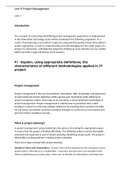Essay
Unit 9 - IT Project Management Distinction grade LAA(Assignment 1)
- Course
- Institution
Unit 9 - IT Project Management Distinction grade LAA(Assignment 1) Marked by Pearson BTEC So no MISTAKES I made if they are the one who GRADED it.. I can show evidence. Cheapest and the most high standards assignments you can find and I give refunds if it doesn't meet your expectations which 99% ...
[Show more]



